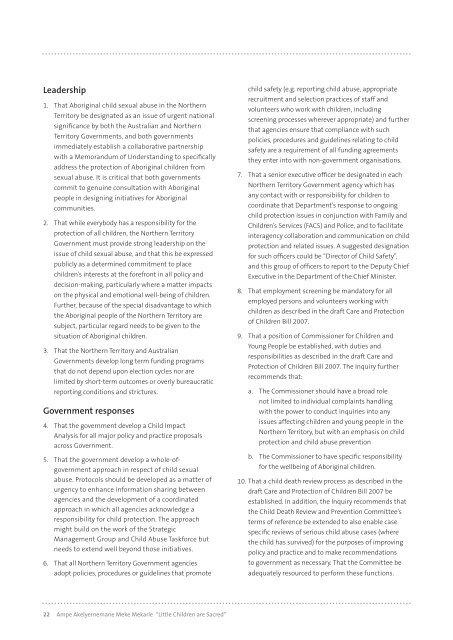bipacsa_final_report
bipacsa_final_report
bipacsa_final_report
Create successful ePaper yourself
Turn your PDF publications into a flip-book with our unique Google optimized e-Paper software.
Leadership<br />
1. That Aboriginal child sexual abuse in the Northern<br />
Territory be designated as an issue of urgent national<br />
significance by both the Australian and Northern<br />
Territory Governments, and both governments<br />
immediately establish a collaborative partnership<br />
with a Memorandum of Understanding to specifically<br />
address the protection of Aboriginal children from<br />
sexual abuse. It is critical that both governments<br />
commit to genuine consultation with Aboriginal<br />
people in designing initiatives for Aboriginal<br />
communities.<br />
2. That while everybody has a responsibility for the<br />
protection of all children, the Northern Territory<br />
Government must provide strong leadership on the<br />
issue of child sexual abuse, and that this be expressed<br />
publicly as a determined commitment to place<br />
children’s interests at the forefront in all policy and<br />
decision-making, particularly where a matter impacts<br />
on the physical and emotional well-being of children.<br />
Further, because of the special disadvantage to which<br />
the Aboriginal people of the Northern Territory are<br />
subject, particular regard needs to be given to the<br />
situation of Aboriginal children.<br />
3. That the Northern Territory and Australian<br />
Governments develop long term funding programs<br />
that do not depend upon election cycles nor are<br />
limited by short-term outcomes or overly bureaucratic<br />
<strong>report</strong>ing conditions and strictures.<br />
Government responses<br />
4. That the government develop a Child Impact<br />
Analysis for all major policy and practice proposals<br />
across Government.<br />
5. That the government develop a whole-ofgovernment<br />
approach in respect of child sexual<br />
abuse. Protocols should be developed as a matter of<br />
urgency to enhance information sharing between<br />
agencies and the development of a coordinated<br />
approach in which all agencies acknowledge a<br />
responsibility for child protection. The approach<br />
might build on the work of the Strategic<br />
Management Group and Child Abuse Taskforce but<br />
needs to extend well beyond those initiatives.<br />
6. That all Northern Territory Government agencies<br />
adopt policies, procedures or guidelines that promote<br />
Ampe Akelyernemane Meke Mekarle “Little Children are Sacred”<br />
child safety (e.g. <strong>report</strong>ing child abuse, appropriate<br />
recruitment and selection practices of staff and<br />
volunteers who work with children, including<br />
screening processes wherever appropriate) and further<br />
that agencies ensure that compliance with such<br />
policies, procedures and guidelines relating to child<br />
safety are a requirement of all funding agreements<br />
they enter into with non-government organisations.<br />
7. That a senior executive officer be designated in each<br />
Northern Territory Government agency which has<br />
any contact with or responsibility for children to<br />
coordinate that Department’s response to ongoing<br />
child protection issues in conjunction with Family and<br />
Children’s Services (FACS) and Police, and to facilitate<br />
interagency collaboration and communication on child<br />
protection and related issues. A suggested designation<br />
for such officers could be “Director of Child Safety”,<br />
and this group of officers to <strong>report</strong> to the Deputy Chief<br />
Executive in the Department of the Chief Minister.<br />
8. That employment screening be mandatory for all<br />
employed persons and volunteers working with<br />
children as described in the draft Care and Protection<br />
of Children Bill 2007.<br />
9. That a position of Commissioner for Children and<br />
Young People be established, with duties and<br />
responsibilities as described in the draft Care and<br />
Protection of Children Bill 2007. The Inquiry further<br />
recommends that:<br />
a. The Commissioner should have a broad role<br />
not limited to individual complaints handling<br />
with the power to conduct inquiries into any<br />
issues affecting children and young people in the<br />
Northern Territory, but with an emphasis on child<br />
protection and child abuse prevention<br />
b. The Commissioner to have specific responsibility<br />
for the wellbeing of Aboriginal children.<br />
10. That a child death review process as described in the<br />
draft Care and Protection of Children Bill 2007 be<br />
established. In addition, the Inquiry recommends that<br />
the Child Death Review and Prevention Committee’s<br />
terms of reference be extended to also enable case<br />
specific reviews of serious child abuse cases (where<br />
the child has survived) for the purposes of improving<br />
policy and practice and to make recommendations<br />
to government as necessary. That the Committee be<br />
adequately resourced to perform these functions.


